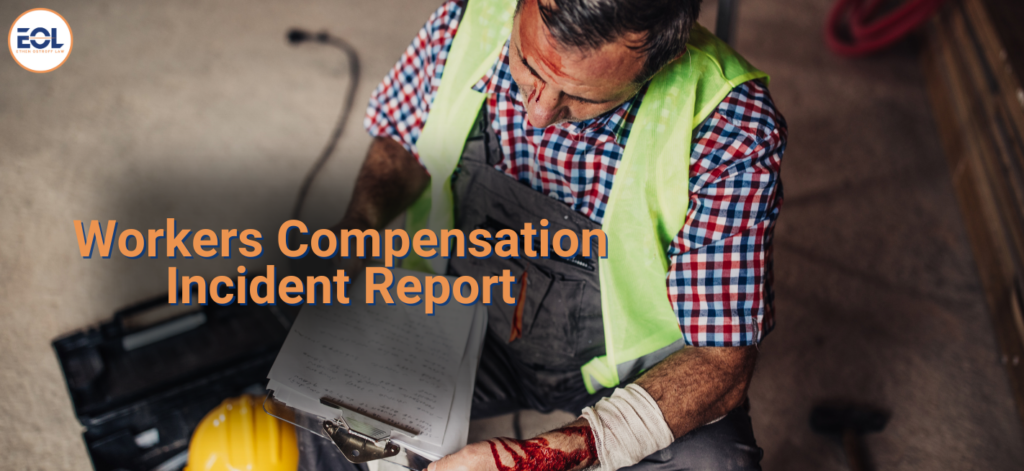Workers Comp Incident Report: The Claims Process Guide
In the hustle and bustle of the workplace, accidents can happen. Whether it’s a slip, a fall, or a mishap with machinery, workplace injuries are unfortunately common occurrences. When such incidents transpire, it is vital to understand your rights and responsibilities, particularly concerning the workers comp incident report. In this guide, we delve into the significance of reporting injuries promptly, address common concerns like whether you can sue your employer for not reporting your injury, explore the timeframe for reporting work injuries, and discuss what options are available if you are hesitant to file for workers comp.
What Is Workers Compensation?
Workers’ compensation or workers’ comp is insurance that offers financial and medical aid to employees injured on the job, aiming to settle claims without lawsuits. It’s a safety net providing medical care and financial help during recovery, shielding both workers and employers. Benefits include medical expenses, lost wage compensation, and sometimes vocational rehabilitation. Laws vary by state, but most employers must have coverage. This system promotes workforce stability by aiding injured employees and safeguarding employers from legal battles.
What Are the Types of Workers Comp Benefits?
Workers comp benefits are crucial for injured workers to receive proper support. Here are the various types:
- Death benefits: Aid for dependents of workers who die from work-related incidents, covering funeral expenses and financial support.
- Medical benefits: Coverage for treatment costs, including doctor visits, surgeries, medications, and therapy.
- Permanent disability benefits: Compensation for long-term impairment, paid in lump sums or installments.
- Specific loss benefits: Lump-sum payments for permanent injuries like limb loss or disfigurement.
- Temporary disability benefits: Partial wage replacement for workers temporarily unable to work due to injury or illness.
- Vocational rehabilitation services: Assistance for injured workers to find suitable employment if they cannot return to their previous job.

What Are the Injuries Covered Under Workers Comp?
Workers’ comp typically covers various workplace injuries and illnesses, including:
- Mental health conditions: Stress, trauma, or harassment-related conditions.
- Occupational diseases: Linked to specific industries, like asbestosis or black lung disease.
- Occupational illnesses: Resulting from workplace exposure to hazardous substances.
- Aggravated pre-existing conditions: Worsened by work-related activities.
- Repetitive stress injuries: From repetitive motions, like carpal tunnel syndrome.
- Traumatic injuries: Sudden accidents such as falls or vehicle collisions.
Coverage specifics vary by state, and consulting a workers’ comp attorney can clarify eligibility criteria in your jurisdiction.
What Are the Common Types of Workplace Injuries?
Workplaces host numerous accidents and injuries. Recognizing common types can help both employees and employers in prevention efforts, fostering a safer environment. Here are common workplace injuries:
- Exposure to hazardous substances: Chemical exposure can lead to respiratory problems, skin conditions, and long-term health issues.
- Fires and explosions: Burns, smoke inhalation injuries, and other serious harm can occur in workplaces with flammable materials.
- Lifting injuries: Result from improper lifting techniques, causing back injuries, hernias, and muscle strains.
- Machinery accidents: Operating heavy machinery risks crush injuries, amputations, and lacerations due to malfunctions or negligence.
- Repetitive strain injuries: Stem from repeated motions or overuse, leading to conditions like carpal tunnel syndrome and tendonitis.
- Slips, trips, and falls: Often caused by wet floors, uneven surfaces, or obstacles, resulting in sprains, strains, fractures, and head injuries.
- Struck-by accidents: Workers hit by falling objects or moving equipment, causing fractures, concussions, and internal injuries.
- Violence in the workplace: Physical assaults or threats can cause physical injuries and emotional trauma.
Who Qualifies for Workers Comp?
Workers’ comp eligibility varies by jurisdiction and injury circumstances. In general:
- Certain worker categories: Some workers, like agricultural or domestic workers, may have different eligibility rules or exemptions.
- Employees: Most workers, including full-time, part-time, and seasonal employees, are covered, regardless of employer size.
- Independent contractors: Coverage depends on legal classification and local laws; some may not be covered.
- Injury originating from employment: Eligible injuries must occur during job-related activities.
- No willful misconduct or intoxication: Benefits typically are not available for injuries resulting from misconduct or intoxication.
- Timely reporting injury at work and compliance: It is crucial to report injuries promptly and follow employer and jurisdictional procedures for eligibility. Consulting a workers’ comp attorney can offer guidance through the process.
- Volunteers: Coverage varies based on work nature, organization, and jurisdictional laws.
Your Rights and Duties When Reporting Injury at Work
When you are injured on the job, knowing your rights and duties is crucial. You are entitled to medical care and can file for workers’ comp to cover expenses and lost wages. It is also your duty to be truthful about what happened and assist in any inquiries by your employer or their insurance provider.

What Is a Workers Comp Incident Report?
The workers compensation incident report serves as a crucial document in cases involving workplace injuries. It’s the formal record of what transpired, documenting the details surrounding the incident, the nature of the injury sustained, and the individuals involved. Prompt and accurate completion of this report is essential, as it initiates the process of seeking compensation and benefits for your injury.
What Is the Process for Submitting a Workers Comp Incident Report?
Submitting a workers comp incident report may sound complicated, but it’s simpler than you think. Here is a step-by-step guide to help you through the process:
- Notify your employer: Report the injury immediately to your employer or supervisor.
- Seek medical treatment: Get treatment from an approved healthcare provider for your work-related injury.
- Complete the incident report form: Fill out the provided incident report form accurately and thoroughly.
- Provide accurate information: Be honest and detailed when describing the injury and how it occurred.
- Submit the report: Hand in the completed incident report form to your employer or their designated representative.
- File a workers’ comp claim: Complete required paperwork per state guidelines, describe injury thoroughly, keep a copy, submit as instructed, and follow state regulations.
- Follow up as needed: Stay in touch with relevant parties, provide requested information, and attend appointments.
- Consult with an attorney: Consider seeking advice from a workers’ comp attorney if you encounter challenges with your claim.
What Information Should Be Included in a Workers Comp Incident Report?
In a workers comp incident report, the following should be included so that employers can ensure thorough documentation and proper handling of workplace incidents:
- Full details of the incident: Include the date, time, and location of the incident.
- Employee information: Full name of the injured employee and any witnesses present.
- Injury details: Describe the nature and severity of the injury, illness, or near miss.
- Medical treatment: Record any first aid provided or medical care received following the incident.
- Incident description: Provide a detailed account of the events leading up to the incident.
- Witness information: Names of witnesses to the incident, if any.
- Actions taken: Outline any corrective measures or actions to be taken due to the incident.
- Employee’s account: Allow space for the injured employee to explain their perspective on the incident.
- Supervisor’s investigation: Include details from the supervisor’s incident investigation report.
- Claim tracking: Track the status of the claim, including certification approvals and essential reporting documentation.
What Are the Consequences of Submitting an Incomplete Workers Comp Incident Report?
Submitting an incomplete workers comp incident report can lead to several consequences:
- Complications in appeals: Incomplete reports may lead to hurdles in appeals, necessitating additional evidence or documentation.
- Delayed processing: Incomplete information may prolong claim processing, requiring additional time to gather necessary details.
- Legal implications: Inaccurate information may have legal consequences, impacting fraud allegations or further legal action.
- Loss of credibility: Inconsistent information may raise doubts about claim legitimacy, affecting credibility with the insurance carrier.
- Potential denial of benefits: Insufficient information may result in claim denial, as thorough documentation is needed for eligibility.
To prevent these issues, ensure your workers comp incident report is accurate and thorough. Consult a workers’ comp attorney for guidance if needed.
How Long Do You Have to Report Work Injury?
The timeframe for reporting injury at work varies depending on state laws and company policies. However, it’s recommended to report any workplace injury immediately after it occurs. Delays in reporting can potentially jeopardize your ability to receive workers’ comp benefits. By promptly notifying your employer and completing the necessary paperwork, you ensure that your injury is properly documented, and the claims process can proceed smoothly.
Can I Sue My Employer for Not Reporting My Injury?
One common question that arises among injured workers is whether they can take legal action against their employer for failing to report their injury. In most cases, the answer is no. Workers’ compensation laws typically shield employers from lawsuits related to workplace injuries. Instead, the workers’ compensation system is designed to provide a no-fault insurance program, offering benefits to employees who sustain work-related injuries or illnesses, regardless of fault.

What Are the Employers' Reasons for Failing to Report Eligible Workers' Comp Claims?
Employers may fail to report eligible workers’ comp claims due to various reasons:
- Avoiding investigations: They may dodge investigations to sidestep potential penalties.
- Fear of premium hikes: They worry over increased insurance premiums may lead to underreporting.
- Lack of awareness: Some employers may not grasp their legal reporting obligations.
- Misclassification beliefs: Some mistakenly believe certain incidents are not covered by workers’ comp.
- Productivity pressures: Prioritizing productivity over injury reporting occurs, especially in fast-paced environments.
- Reputation concerns: Fearing damage to their image or appearing unsafe, some avoid reporting claims.
- Retaliation fears: Concerns over retaliation or discrimination claims deter reporting.
To address these issues, proactive steps like fostering safety culture and educating people on reporting importance are crucial.
What If I Don't Want to File Workers Comp?
If you are unsure about filing for workers’ comp, it is normal to have concerns about potential consequences or retaliation from your employer. However, remember that workers’ comp benefits exist to support injured workers. They are designed to ensure you receive the necessary care and compensation for your injuries. Avoiding filing a claim could lead to benefits being denied, leaving you responsible for covering your medical expenses and lost wages on your own.
Where Does Ethen Ostroff Law Come In?
The workers’ comp incident report plays a pivotal role in the aftermath of a workplace injury. By promptly reporting injuries, you protect your rights and initiate the process of seeking compensation and benefits. While you generally cannot sue your employer for failing to report your injury, you do have the right to pursue workers’ comp benefits.
Ethen Ostroff Law steps in to support you when dealing with workplace injuries. We understand the importance of prompt and accurate workers comp incident reporting, ensuring your rights are protected. Our team guides you through the claims process, advocating for your rights, ensuring proper documentation, and obtaining the compensation and benefits you deserve.


